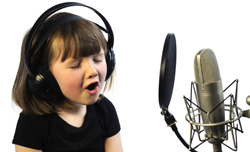I’m sure you’re aware of the voice-over industry. Media producers of all kinds contract voice actors to read commercials, audio books, videos, animated productions, etc. Apparently, there is also an industry in selling the dream of becoming a highly-paid voice actor – the business of certain voice-over coaches promising to get you closer to Hollywood producers. Before I go further, let me state that there ARE lots of reputable and helpful VO coaches out there that won’t charge you tons of money in exchange for a false promise. They genuinely sell their service of helping you become a better voice actor.
But the sub-industry of coaches promising the moon for a lot of your money is growing. And you should be wary.
In my experience, the only way to make money as a voice over actor is the same as any actor – start with talent, get a bit of help, and then start auditioning, auditioning, auditioning. And also like any successful actor, you’ve got to have a thick skin and freakish level of persistence. Even then, you’ll probably not make more than a decent living wage. It is the rare – and extraordinarily lucky actor of any kind, that makes the big big bucks.
If you are serious about getting into the voice-over business, see my article Voice Over Jobs: Where to Find Them and How to Get Them, which will show you how to get started. I’ll now add to that the advice to be careful about finding a voice-over coach. My advice is to avoid anyone wanting to charge you more than about $100 per hour. And of course, you should ask other voice-over actors you meet along the way to recommend someone.
See this article for more on the scam of terrible coaching: http://www.thevoiceovercoach.com/voiceoverblog/the-hollywood-myth-that-people-are-selling-you-is-exactly-that-a-myth
Voice Over Recording
Microphone Tips For Voice-Over Actors
 I am a voice-over actor as well as a musician, so Home Brew Audio provides articles and tutorials on both types of recording. Vocal recording for voice-over actors is mostly the same as for musicians but for one thing – there is no music mixed in behind a voice-over recording (at least not usually, and not for long it there is some). So it is that much more important to get the cleanest (least noise) and clearest (best audio quality) recording possible.
I am a voice-over actor as well as a musician, so Home Brew Audio provides articles and tutorials on both types of recording. Vocal recording for voice-over actors is mostly the same as for musicians but for one thing – there is no music mixed in behind a voice-over recording (at least not usually, and not for long it there is some). So it is that much more important to get the cleanest (least noise) and clearest (best audio quality) recording possible.
I found an article on Audiolinks.com yesterday offering 3 microphone tips for voice-over actors. They are good tips, but I wanted to add some things to that post.
The author’s second tip speaks of creating unique tones. He mentions getting closer to the mic to create a deeper sound. This is called “the proximity effect,” and will only work if the mic has a cardioid pick-up (sometimes called “polar”) pattern. Most mics will have that pattern by default, but if you use a multi-pattern mic (my main mic, the Rode NT2-A is one such), you can choose cardioid, figure-8 or omni-directional pickup patterns. So you should be aware that if you are using, say, the “omni” setting, you will not get the proximity effect by moving closer to the mic. By the way, for a review of pickup patterns, see may article Directional and Omnidirectional Microphones – What Are They Good For?
I agree with the “3-tips” tips in the article. But I thought I’d add something about types of microphones. All other things being equal, a voice-over actor should be using a large diaphragm condenser microphone LDC). They typically sound much better than dynamic mics for a variety of reasons (see our article What Are The Different Types of Microphones?). There are some dynamic mics that work well for voice-over, such as the ElectroVoice RE20, which is a very popular broadcast mic. But these are usually more expensive than most LDCs that are excellent for voice-over. The RE20, for example, costs $450.
I did a review of the Audio-Technica AT2035, complete with audio examples, if you’d like to hear what a decent voice-over mic costing $149 sounds like. That post is here: Review of the Audio-Technica AT2035 Microphone.
So enough of my stump-speech. The 3-tips article is here: https://www.audiolinks.com/blog/4-microphone-tips-for-voice-over-actors/
Cheers!
How To Record Vocals In A Home Studio
 Vocals can be unforgiving when it comes to recording time. As complex as they are, listeners are intimately familiar with what a voice should sound like. Because of this, a bad vocal track or mix can stand out like a sore thumb. Starting off right with a great vocal recording will make the mixing and mastering processes much easier. Remember, there are some things that just can’t be polished.
Vocals can be unforgiving when it comes to recording time. As complex as they are, listeners are intimately familiar with what a voice should sound like. Because of this, a bad vocal track or mix can stand out like a sore thumb. Starting off right with a great vocal recording will make the mixing and mastering processes much easier. Remember, there are some things that just can’t be polished.
You can read the full guide for recording vocals in a home studio here: https://www.musicclout.com/contents/article-122-recording-vocals-professionally-in-a-home-studio.aspx
Troubleshooting A Voice Over Session
Voice over gigs can be hard to come by if you’re just starting out, and deadlines can be tight. This can increase the stress level dramatically when trouble rears its head. If you’ve already gone through the obvious possible solutions, take a step back and follow a logical approach to determine the source of your problem.
You can read more here: https://www.audiolinks.com/blog/troubleshooting-tips-in-the-voice-over-recording-studio/
Recording Tips For Podcasts
Podcasts are very similar to all other audio recording, yet also very different. The basic principles of striving for a clean and clear recording still apply, but there may be additional challenges that you face that musicians may not think about. Recording on-location adds in the concerns of wind and other background noise, so choose your equipment carefully.
You can read more podcast recording tips here: http://www.podcasting-tools.com/audio-recording-tips.htm